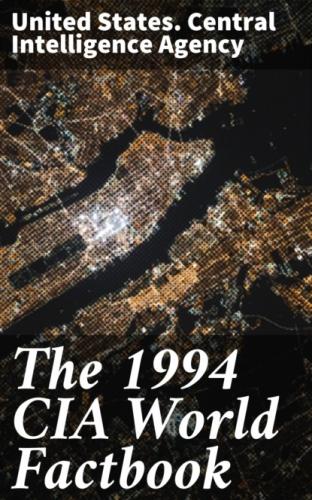Rio de Janeiro, Rio Grande do Norte, Rio Grande do Sul, Rondonia,
Roraima, Santa Catarina, Sao Paulo, Sergipe, Tocantins
Independence:
7 September 1822 (from Portugal)
National holiday:
Independence Day, 7 September (1822)
Constitution:
5 October 1988
Legal system:
based on Roman codes; has not accepted compulsory ICJ jurisdiction
Suffrage:
voluntary between 16 and 18 years of age and over 70; compulsory over
18 and under 70 years of age
Executive branch:
chief of state and head of government:
President Itamar FRANCO (since 29 December 1992); election last held
15 November 1989, with runoff on 17 December 1989 (next to be held
October 1994); results - Fernando COLLOR de Mello 53%, Luis Inacio
LULA da Silva 47%; note - first free, direct presidential election
since 1960; Fernando COLLOR de Mello was impeached in December 1992
and succeeded by former Vice President Itamar FRANCO
cabinet:
Cabinet; appointed by the president
Legislative branch:
bicameral National Congress (Congresso Nacional)
Federal Senate (Senado Federal):
election last held 3 October 1990 (next to be held October 1994);
results - percent of vote by party PMBD 33%, PFL 16%, PSDB 12%, PDS
4%, PDT 6%, PT 1%, other 28%; seats - (81 total as of 3 February 1991)
PMDB 27, PFL 15, PSDB 10, PTB 8, PDT 5, other 16
Chamber of Deputies (Camara dos Deputados):
election last held 3 October 1990 (next to be held October 1994);
results - PMDB 21%, PFL 17%, PDT 9%, PDS 8%, PRN 7.9%, PTB 7%, PT 7%,
other 23.1%; seats - (503 total as of 3 February 1991) PMDB 108, PFL
87, PDT 46, PDS 43, PRN 40, PTB 35, PT 35, other 109
Judicial branch:
Supreme Federal Tribunal
Political parties and leaders:
National Reconstruction Party (PRN), Daniel TOURINHO, president;
Brazilian Democratic Movement Party (PMDB), Luiz HENRIQUE da Silveira,
president; Liberal Front Party (PFL), Jorge BORNHAUSEN, president;
Workers' Party (PT), Luis Inacio LULA da Silva, president; Brazilian
Workers' Party (PTB), Rodrigues PALMA, president; Democratic Workers'
Party (PDT), Leonel BRIZOLA, president; Progressive Renewal Party
(PPR), Paulo MALUF, president; Brazilian Social Democracy Party
(PSDB), Tasso JEREISSATI, president; Popular Socialist Party (PPS),
Roberto FREIRE, president; Communist Party of Brazil (PCdoB), Joao
AMAZONAS, secretary general; Liberal Party (PL), Flavio ROCHA,
president
Other political or pressure groups:
left wing of the Catholic Church and labor unions allied to leftist
Workers' Party are critical of government's social and economic
policies
Member of:
AfDB, AG (observer), CCC, ECLAC, FAO, G-11, G-15, G-19, G-24, G-77,
GATT, IADB, IAEA, IBRD, ICAO, ICC, ICFTU, IDA, IFAD, IFC, ILO, IMF,
IMO, INMARSAT, INTELSAT, INTERPOL, IOC, IOM (observer), ISO, ITU,
LAES, LAIA, LORCS, MERCOSUR, NAM (observer), OAS, ONUSAL, OPANAL, PCA,
RG, UN, UNAVEM II, UNCTAD, UNESCO, UNHCR, UNIDO, UNOMOZ, UNOMUR,
UNPROFOR, UPU, WCL, WHO, WFTU, WIPO, WMO, WTO
Diplomatic representation in US:
chief of mission:
Ambassador Paulo Tarso FLECHA de LIMA
chancery:
3006 Massachusetts Avenue NW, Washington, DC 20008
telephone:
(202) 745–2700
FAX:
(202) 745–2827
consulate(s) general:
Boston, Chicago, Hong Kong (Trust Territories of the Pacific Islands),
Los Angeles, Miami, New York, and San Juan (Puerto Rico)
consulate(s):
Houston and San Francisco
US diplomatic representation:
chief of mission:
Ambassador Melvyn LEVITSKY
embassy:
Avenida das Nacoes, Lote 3, Brasilia, Distrito Federal
mailing address:
APO AA 34030
telephone:
[55] (61) 321–7272
FAX:
[55] (61) 225–9136
consulate(s) general:
Rio de Janeiro, Sao Paulo
consulate(s):
Porto Alegre, Recife
Flag:
green with a large yellow diamond in the center bearing a blue
celestial globe with 27 white five-pointed stars (one for each state
and district) arranged in the same pattern as the night sky over
Brazil; the globe has a white equatorial band with the motto ORDEM E
PROGRESSO (Order and Progress)
@Brazil, Economy
Overview: The economy, with large agrarian, mining, and manufacturing sectors, entered the 1990s with declining real growth, runaway inflation, an unserviceable foreign debt of $122 billion, and a lack of policy direction. In addition, the economy remained highly regulated, inward-looking, and protected by substantial trade and investment barriers. Ownership of major industrial and mining facilities is divided among private interests - including several multinationals - and the government. Most large agricultural holdings are private, with the government channeling financing to this sector. Conflicts between large landholders and landless peasants have produced intermittent violence. The COLLOR government, which assumed office in March 1990, launched an ambitious reform program that sought to modernize and reinvigorate the economy by stabilizing prices, deregulating the economy, and opening it to increased foreign competition. The government also obtained an IMF standby loan in January 1992 and reached agreements with commercial bankers on the repayment of interest arrears and on the reduction of debt and debt service payments. Galloping inflation (the rate doubled in 1992 and by March 1994 had risen to 42% per month) continues to undermine economic stability. Itamar FRANCO, who assumed the presidency following President COLLOR'S resignation in December 1992, was out of step with COLLOR'S reform agenda; initiatives to redress fiscal problems, privatize state enterprises, and liberalize trade and investment policies have lost momentum. Brazil's natural resources remain a major, long-term economic strength National product: GDP - purchasing power equivalent - $785 billion (1993 est.) National product real growth rate: 5% (1993) National product per capita: $5,000 (1993 est.) Inflation rate (consumer prices):
